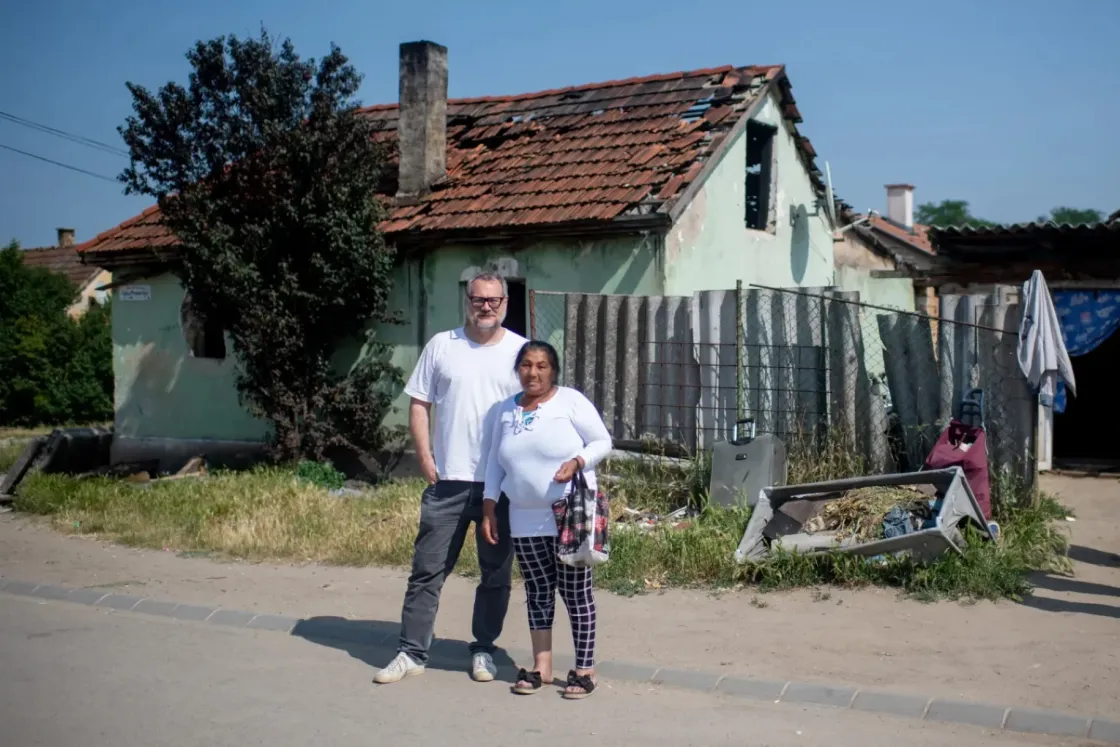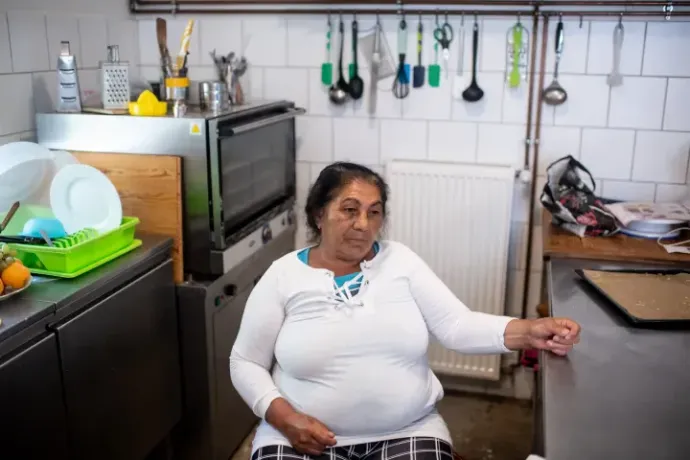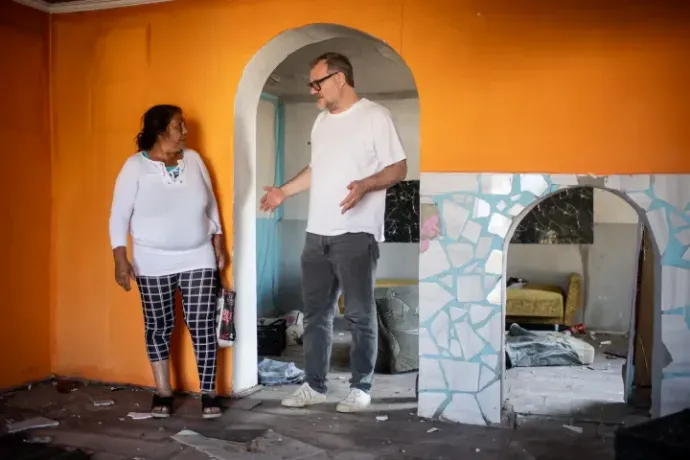
“I don't mind the camera, I can be natural around it", Jolika Vidák Oláhné, who has now accumulated a serious cinematic portfolio, pointed out at the outset. She then listed her credits: she played the lead role in Zsuzsa Debre's graduation film Anja, she appeared in RTL’s series A Nagy Fehér Főnök (The Big White Boss), in Anima Sound System’s music video for their song Öltöztessél fehérbe (Dress Me in White), and in a commercial made for a bank.
It was a production manager who had recommended the 62-year-old woman living in Tabán, the Roma settlement in Monor, to Bálint Kenyeres, which led to her becoming one of the leading characters in his short film No.3 (The Spectacle), which was screened at Cannes. The director says that Jolika did a professional job throughout the two days of shooting, even though she was ill, as did 12-year-old Vilmos, who played her grandson.
Since the National Film Institute had turned down all of Kenyeres' feature film project ideas in recent years, he was forced to start thinking in terms of short films, and then one night he dreamed up the story for No.3 (The Spectacle). He then spent months preparing for the shoot with producer Anna Bartók, visiting dozens of Roma settlements across the country.
The magical and realistic short film is about a Roma boy and his grandmother. The boy has a superpower, so they are visited by a television crew from a commercial channel to film a short report about the child. The report is completed, but they don’t get much joy out of it.
To provide a little more
Jolika has been employed by the local chapter of the Hungarian Charity Service of the Order of Malta for twenty-one years. For a long time, she was a kind of jack-of-all-trades at their after-school facility, and for the past eight years she has been working in their bakery. She was born in Monor, has lived there her entire life with the exception of a brief period, and has no plans to leave. She has been married for 43 years and has four sons, seven grandchildren, and one great-grandchild.
She never thought about acting; she wanted to be a nursery school teacher or a hairdresser when she was young, but her mother wouldn't let her continue her education. She finished eighth grade and then went on to a vocational school. She got married at nineteen, and had her first son at twenty-two, followed by three more boys. She says that a big family is great, and that she could have had “a whole soccer team,” but she consciously decided not to have more children so that she could provide more from the little bit they had to those who were already here.

Jolika says that her life could be the subject of a novel. "They say there is no hell on Earth, but there is. My childhood was hell. That's supposedly what made me so strong. There aren't many who could endure what I've been through in my 62 years," she said, recalling her abusive mother, who didn't love her even when she was in her womb, and her four siblings, with whom she only got to eat a cooked meal twice a week at most. She also spoke about her husband, and how everything started all over again when she married him, only this time it was not her mother who was abusing her.
However, she vowed that as long as she had the strength, she would not let her children suffer the same fate as her; so that they would at least always have shoes to wear and a cooked meal to eat. But there were still times when she didn't have money for a loaf of bread for the next day. She recounted how once, when she was watching TV with her children on New Year's Eve and they showed delicious food on the screen, she pulled the blanket over her head so her sons wouldn't see her crying.
Don't preach from your velvet chair
Her favourite things to watch on TV are true stories and she can't stand channels which are constantly showing political programmes.
She always votes, even though it seems to not matter whether she does or not, because nothing ever changes. She hasn't seen a politician in her neighborhood for quite some time. She says that the previous mayors would sometimes visit them, but now, as soon as they hear the name Tabán, they just shrug their shoulders.
When asked what message she would send to political leaders, she replied with an impassioned train of thought:
"I would bring the high-ups down here so they could experience for themselves what's going on. Quit the preaching from your plush chairs and come here and see reality!
I would even dare to say something to Viktor Orbán. Why, who is he? He's also just a man.
He should thank the people for electing him. And yes, he should come out and experience what is going on here. What would I say to him? Please, Mr. Minister, come down here and see what poverty is, see that there is nowhere to live, there's no sewage system, many people have no toilet or running water, but you don't have such problems. Or if you wonder why that poor little child is out on the street in the scorching sun all day long… Instead of sending them to an institution and giving a kilo of potatoes to their family, you should give people work and pay them so they can live,“ she said, adding that if the world did not revolve around money and power, but was ”driven by love," there would be no war or poverty either.
Despite all this, she still believes in perseverance, honour, and hard work, and thinks that everyone should decide for themselves how they want to live. “Because God gave people free will so we would use it,” although she adds that sometimes it doesn't hurt if someone takes another person's hand.
There is more than enough in the system for this to be changed
Bálint Kenyeres said that Jolika is in many ways a truly exceptional character in the settlement, but one cannot expect everyone to have her attitude and strength. "These people are constantly living their lives with their heads under water, and not only are they unable to get ahead, but they’re glad if they can come up for air every once in a while.
Ninety-nine percent of their energy is spent on survival.
These Roma people are effectively locked up in the Roma settlements – I don't like to euphemistically call them "segretated communities": the gates have been closed behind them, the keys have been thrown away, and apart from a few obsessed individuals, no one cares what happens to them. This is outrageous, because I am convinced that there is more than enough in the system to prevent this from happening," said the director, who has been a relatively frequent guest at Monor's Tabán recently. In his opinion, it is impossible to get used to the sight of such hopeless poverty.

Kenyeres said that when they had first arrived at the camp “like a circus troupe,” their basic principle was to try to treat the locals as ethically as possible. “We were like doctors:
If we aren’t able to help, let’s at least make sure we do no harm.
Let's not lie and let's not promise anything we can't deliver. My hope is that nobody's life has gotten worse because of our presence, but I'm afraid it hasn't gotten any better either."
Complaining would be inappropriate
Preparations for the 16-minute short film lasted five months, with hundreds of names appearing in the credits. According to the director, even shooting a decent short film requires the same amount of energy as making a feature film, the only difference being that in this case, people's time and expertise are only needed for a few days. As No.3 (The Spectacle) did not receive any state funding, it was financed independently and made on a fairly low budget. Although Kenyeres believes that there is no such thing as a low-budget film, only films where the crew are not paid properly. They also pieced the project together thanks to favors from friends and various in-kind contributions.
"Making a film without money is only possible through self-exploitation and the exploitation of others.
But we made sure to pay for the location and to pay the actors fairly – we didn't want to add to the hardship of those who are already downtrodden. Instead we did it to our friends and family. However, it would be inappropriate to complain about the unsustainability of this and the lack of prospects after a visit such as this one," Kenyeres said later, sitting in one of the restaurants in town. So, in his opinion, even though there are some parallels to be drawn between starving Hungarian filmmakers and socially disadvantaged groups, doing so would be inappropriate.
Bálint Kenyeres' film No.3 (The Spectacle), the only Hungarian entry at this year's Cannes Film Festival, was also featured in the programme of Friss Hús (Fresh Meat – an International Festival of Short Films held annually in Budapest – ed) and is expected to be released in Hungary in the fall.
For more quick, accurate and impartial news from and about Hungary, subscribe to the Telex English newsletter!